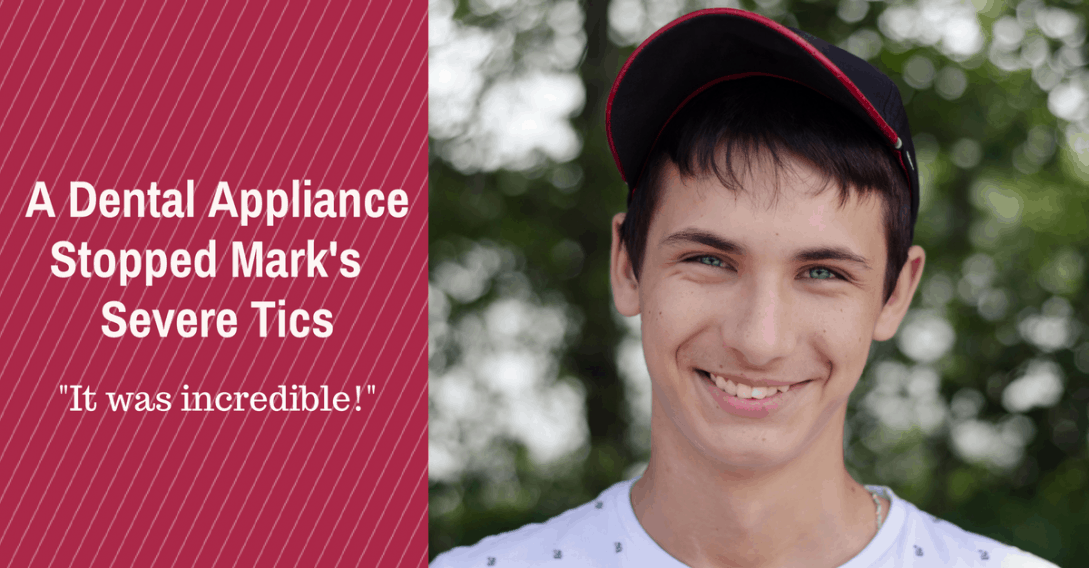A Dental Appliance Stopped Mark’s Severe Tics
BY MARK’S FATHER
My son Mark is now 14 1/2 years old. He’s a wonderful kid—socially accepted, active in sports, and doing well in school. But we went through an absolute nightmare with his tics.
My wife and I started noticing eye tics when he was about 6 or 7. With time, the eye-rolling and blinking increased in severity. He was diagnosed with Tourette syndrome by a local pediatric neurologist. After a couple of years a new tic developed. Now in addition to the eye tics, Mark would repeatedly jerk his head as if trying to get the hair off his forehead.
Needless to say, his mother and I were anxious to give Mark some relief. I started researching what our options were. We implemented a number of interventions along the way: dietary changes, fish oil, pharmaceuticals, magnesium, and essential oils. We also tried cranial sacral therapy and Brain Balance. The Brain Balance sessions did not help his tics, but they did help him focus on academic work. In fact, he used to have trouble generating new ideas for writing assignments (versus writing on specific topics) and we noticed a big improvement in that area. Mark has allergies; we didn’t actively explore a possible allergic connection to the tics but we never noticed any relationship.
Seeking help from dentists instead of a neurologists
Searching for more answers, I read online about people using dental appliances to reduce tics, and we decided to give it a try. We saw a practitioner in our state of Massachusetts who developed an appliance for Mark’s lower jaw. The basic concept is that for some people, a misalignment of the jaw or teeth can create pressure on nerves (in particular, the auriculotemporal nerve) that can impact the central nervous system and result in tics.
The appliance helped reduce tics significantly. Initially there was modest improvement, and after a few weeks the change was dramatic. We went through a number of mouthpieces! Mark lost one. He broke one. Another broke due to his growth. And I had to dig through the trash a couple of times when they were inadvertently tossed away.
Mark didn’t mind wearing the appliance because it made his symptoms so much better. He wore it around the clock unless he was eating. After the appliance broke due to growth, the dentist suggested it was time to use braces instead. Unfortunately, that was a mistake. It turned out that it was premature. About six weeks after we put the braces on, he developed horrible head tics. He would flick his head as if getting his bangs out of his eyes. But he would be doing it so fast that it was like a baseball card in moving bicycle spokes. And it could last for 45 minutes at a time. Sometimes I could physically restrain him and it would stop. But other times it would just go on.
 We took Mark to Dr. Anthony Sims, a dentist in Columbia, Maryland who specializes in craniofacial TMJ. When he saw the severity of the tics, he wasn’t sure they were simply tics. He recommended we go to Johns Hopkins emergency room. After a couple of consultations there, it was determined that the movements were indeed severe tics, and Dr. Sims continued with his evaluation. A few weeks later, we visited the Tic and Tourette’s clinic at Yale University. They looked at videos of those dramatic tics. We learned that Mark in fact did not have Tourette syndrome (there were no classic vocalizations). He had a chronic motor tic disorder. We were told that the dramatic episodes were not the result of his tic disorder, but they were not sure what was causing them.
We took Mark to Dr. Anthony Sims, a dentist in Columbia, Maryland who specializes in craniofacial TMJ. When he saw the severity of the tics, he wasn’t sure they were simply tics. He recommended we go to Johns Hopkins emergency room. After a couple of consultations there, it was determined that the movements were indeed severe tics, and Dr. Sims continued with his evaluation. A few weeks later, we visited the Tic and Tourette’s clinic at Yale University. They looked at videos of those dramatic tics. We learned that Mark in fact did not have Tourette syndrome (there were no classic vocalizations). He had a chronic motor tic disorder. We were told that the dramatic episodes were not the result of his tic disorder, but they were not sure what was causing them.
In any event, Dr. Sims made an adjustment to the treatment we had initially followed; he created an upper mouthpiece in addition to the lower mouthpiece. That worked! We saw some immediate improvement, and within three weeks the tics and urges to tic were practically all gone. Mark was very grateful for the timing of this. His sixth grade class was prepared to go on an end-of-the-year trip, but he had just missed three weeks of school because his tics were too bad for him to attend. His symptoms improved just in time for him to go on the trip.
Sometime later, Mark noticed that he was again feeling an urge to tic. Not ordinary tics, but the dramatic head tics described earlier. This would happen when he exerted himself physically or mentally. He was able to suppress the urges, but that gave him terrible headaches. We saw Dr. Sims again and he showed us that the mouthpiece no longer fit properly and some adjustments were needed. Once those adjustments were made, the tics diminished again.
Success: Moving on without the appliance
This past April, Mark lost one of the mouthpieces. I wanted to take him to see Dr. Sims but he resisted. He pointed out that he’d barely been wearing them during the prior month or so and he felt he didn’t need them anymore. We didn’t force him to go. Instead, we saw our local orthodontist who had been researching this effort along with us and had been communicating with Dr. Sims. We found that having a local professional who understands this approach is invaluable. The orthodontist could make minor adjustments to the appliance and help us brainstorm situations. This doctor suggested that Mark’s jaw seemed to have grown into the position that the mouthpieces had been guiding it to. So he didn’t need to keep wearing a mouthpiece. Dr. Sims also agreed that Mark might not need one any longer now that his jaw growth was nearly complete.
Since April, Mark has been completely asymptomatic and without an appliance. He has never gone so long without tics! The entire family is very grateful for this intervention. For us, it was incredible.
I would implore others to research this approach. I’ve read that perhaps this only helps people who have TMJ issues. But if my son had TMJ problems, we were completely unaware of it. Both the dentists we worked with said their success rate for treating tics is over 50%.
Let’s spread the word! Any questions?
Obviously not everyone has the same cause for their tics. But if this is the underlying problem, it is incredibly important to address it. Unfortunately this therapy is not covered by insurance at this time. Hopefully it will be covered in the future.
I want to help get the word out on this approach! I hope you will use the comment section below to ask me any questions.
Editor’s note: The identity of this family has been withheld at their request; a stock photo was used.










This is an incredible story! Thank you for sharing it, especially on this forum. I know the word will get out there. Question: Did this therapy also help with his eye-rolling tics? Also, what is Brain Balance please? Lastly, I haven’t heard of the Yale clinic either. It’s like our own situation may be OCD, not Tourette’s as originally thought, but I feel like no one can really diagnose all this stuff, I am not sure that we aren’t dealing with both OCD and Tourette’s. Thank you for your time!
How do you locate orthodontists that are familiar with this treatment? My son developed a tic 1 month after having a dental expander installed and it’s been a year now.
Can you share the cost of this procedure? Also, what if the child also needs orthodontics done?
Hi Laura, brl and Marta
For some reason my response to Laura yesterday did not show up. So I’ll respond to all three posts here.
Yes, the appliance stopped his eye tics. It stopped all of his tics and his urges to tic.
Brain Balance is a franchised treatment center primarily for children with learning and/or social issues. The brain balance philosophy asserts that all sorts of diagnoses (adhd, aspergers, dyslexia, tourette’s, etc. ) are symptoms of what I think they call Functional Disconnection Syndrome. The treatment is expensive, time consuming and rigorous. We were terribly dissapointed when we completed it and my son’s tics had not diminished. But now that we’ve found a different treatment for his tics, I’m pleased with it because it did help his school work and perhaps his social life.
When I was actively looking at current medical research on Tourette’s, it seemed like about half of what I saw was from Yale University. And a lot of those were written by Dr. King. So in terms of the medical community, these guys are probably the top of the list. You can make an appointment with the Yale Tic & Disorder clinic and meet with Dr. King and his staff. They do not become your doctor, but you can meet with them for a consultation. I believe there is quite a long wait. We got in quickly because my son’s tics were so severe.
In terms of OCD and tourette’s, from what I understand they quite often accompany each other.
I believe there are three doctors that are known for this work. Dr. Stack (I think he sold his practice to Dr. Brown) in the DC area, Dr. Sims in the Baltimore area, and Dr. Dimersian (sp?) somewhere in California. But I’m sure there are others with at least some experience. When I had first called Dr. Stack, he referred me to Dr. Lockerman (Worcester, MA). Dr. Lockerman was just visiting with Dr. Stack to learn about the treatment. I also got a local orthodontist involved (Dr. Demaio – Northampton, MA). So you may be able to find others near you. Or you might want to call the three main doctors and see if they can refer anybody in your area.
By the way, I would recommend that you go to Dr. Stack’s website and watch some of the before and after videos. The are dramatic.
The cost varies between practitioners. One of them was far more expensive and required an MRI. The others were more affordable. The Massachusetts doctors that I worked with were quite inexpensive. They didn’t want to charge much because my son was there first patient. And yes, the mouthpieces that they made did help my son.
I don’t think you can have braces and wear a mouthpiece. But you should talk with doctors about that.
Best
Bigal
Thank you for your reply and again for the inspiring and informative post. :-)
Hi My name is Rui Fonseca I´m from Portugal and have a soon with Tourette´s
I feel a litle lost, trying different approches and avoiding taking drugs for now.
I have a big hope on the mouthpice, but my soon neurologist don´t and besides here in Portugal is an unkown approch.
What should i do to help my soon?
Good bless
Hi Bigal, a few more questions, as I’ve started researching this. I couldn’t tell from your article how long your son wore the device before his jaw grew into position? Also, if you’re willing to answer: did insurance cover any of the costs here? how much does one device cost roughly? Is it hard to talk with the device in? Thank you!
Hi there,
Thank you for your story. I am hoping for some guidance. I am new to the site. I have a nine year old with Complex Motor Tics. We did get an appliance from one of the founding dentists. It helped my son for a few hours. It has only helped for a few hours after an adjustment. We only have been wearing it for a few weeks. Has anyone had such an experience? I guess I was hoping for some consistent results. I was told he should wear it for six weeks and then follow up. I appreciate any insight anyone has. I just want to help him and my heart breaks all the time for him. Thank you for such a wonderful site and forums!
Hi Michigan, we had a similar experience. We got a device, and it had immediate effect, but then after a few hours, it didn’t seem to help anymore and my daughter doesn’t want to wear it anymore. It’s been frustrating for us, it was very expensive and with the immediate results, we had such high hopes. We have not given up, I am encouraging her to try it when her tics/complusions (OCD) are bothersome but it’s hard to tell if it’s still helping or not. The dentist we’re working with is super helpful, but he lives a three hour drive away so we haven’t been back for an adjustment yet. Please keep us posted on any updates you have, I’ll do the same. Best wishes to you all.
Hi lulu648,
Thank you for sharing your experience. I am still so unsure what to do. We have flown back and had another adjustment done. My son was great at the office and soon starting having his usual tics about four hours later. I cried the whole plane ride home thinking about how much we have invested in this treatment. However, I am trying to see where this goes. My son has been wearing it consistently for over two weeks. I don’t really see any change. I was told to give it a good six weeks to see if this treatment plan will work. It is so hard to see such immediate relief and feel like it is a disappointment. I will keep you posted. I wish you the best luck with your daughter. This is a hard journey and it is hard to navigate through everything. Thanks again for your reply.
If your child has severe or bothersome tics please try CBIT. We have had great results with this! My son had severe tics (sniffing and snorting 30+ times a minute) and the combination of cbit and clonidine have made him almost tic free!! But even if you don’t want to try the drugs, CBIT is drug free and inexpensive and worth a try! I want to share in the hopes others can have as great a result as we have! Find a counselor trained in CBIT (or HRT for tics) and see if it helps.
Thanks so much Betsy. I have tried CBIT twice with no real success. I am wondering if my son is just not able to identify every urge prior to the tic. I have heard many success stories with CBIT. I have tried to motivate him; however, I just can’t get him to practice the way he should. The therapist said maybe I should wait until he is a bit older and try again. I am so grateful for your help. To be honest, I am just lost as how to motivate him. I feel like he just wants to “be a kid” and does not want to do anything. He will practice when I remind him. I have not wanted to make this a “chore” so I just say nothing. I am wondering if I need to find a therapist who will engage him more! Thx again.
Can I just go to my dentist and ask for a mouthpiece fitting? or does it have to be at a certain place? and what would I ask for, a mouthpiece for tmj?